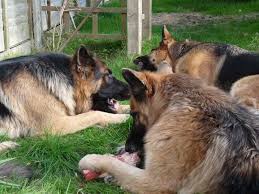How Long Can A Dog Go Without Pooping?
Just like humans, a dog can go without pooping too. If you are wondering how long can dogs go without pooping, here is what you want to know. what is constipation in dogs? signs of constipation in dogs? what causes constipation in dogs? and finally, how to treat constipation in dogs?
How long can dogs go without pooping?
In short, Dogs can go up to a maximum of 48 hours, in other words, 2 full days without pooping. This indicates that your dog is constipated and you need to pay attention to this constipation in dogs.
What is constipation in dogs?
Constipation is referred to as a medical condition where infrequent incomplete defecation with a deposit of hard dry feces.
Under normal circumstances, fecal matter travels through the intestine reaching the colon whose main function is to absorb water and electrolytes from the mess. Fecal matter is moved through the colon in a movement called peristaltic movement or peristaltic waves.
In this process, the fecal matter continues to lose moisture becoming hard and dry and ultimately impossible to pass. Therefore constipation is caused by longer retention of these hard dry feces and dirt.
Some severe signs of constipation in dogs include:
- Pain and vocalization
- Severe discomfort when defecating
- No poop in 3 days
- In appetite, vomiting and lethargy
- Blood in stool
- Distended belly
If you notice that he is straining so hard that he is winning and he is physically in a lot of pain, similarly if he strains for a really long period of time like more than a minute or two and there’s nothing coming out, you need to pay attention right away. This could be a more serious problem or that which needs immediate medical attention.
Mild constipation where you observe your dog not straining much or no blood in their poop indicates mild constipation. This should get normal with simple home remedies
Causes of constipation in dogs
- Intestinal obstruction
- Excessive / inadequate fiber
- Inappropriate diet
- Side effects of medicine
- Inadequate water intake
- Lack of exercise
- Trauma
- Neurological or structural disfunction that causes muscles to disfunction
- Low potassium or calcium in blood
- Hyperparathyroidism – hormonal disease
- Hypothyroidism – hormonal disease
- Arthritis
- Stress
- Impacted anal glands
- Enlarged prostate
- Peri-anal hernias
- Old age
Taking a long time for pooping in dogs may occur due to too high or too little fiber in the diet, lack of exercise, blocked or abscessed England and enlarged prostate gland. Eating bones, dirt, parts of their toy or anything that is going to get clotted in the intestine will consequently lead to constipation.
In rarest cases, cancer, some medication side effects, injuries to the pelvis, some neurological disorder or just simple dehydration can be a cause of constipation
If you find constipation in old dogs, you probably needn’t be worried. Constipation in old dogs is quite normal.
Remedial steps at home and more
- Check your dog’s rear end
- Increase your dog’s water intake
- Take your dogs for more walks
- Use a laxative
- Stool softener
- Food and mineral oil mixture
- Canned pumpkin
- Enema
- More exercise
How to treat constipation in dogs?
Stool softener
The general recommendation is a stool softener. or another medication if it’s a chronic issue to help their intestines strengthen the contractions.
Check your dog’s rear end
Check for the rear end of your pet. Your dog might have got some foreign objects as they tend to play around in garbage like plastic bags. In case that you notice some foreign object never pull it out. Vets say that pulling out might cause more damage than cure. So take your dog to the vet.
If there is matter fur, dogs that has long coats sometimes will have matted fur down there and that’s why the blockage. You might have to take some electric clippers and trim that hair. Make sure you clean up the area so your dog will be able to go to the bathroom again.
More Excercise and walks
Exercise can be the best solution. This body movement stimulates the body and gets things going that promote healthy digestion and thus prevents constipation.
If your dog is bloated, he might feel lethargic and he might not move. So you need to push him, take him for a walk or exercise to keep going.
High-fiber foods like canned pumpkin can be a good option that you might want to look for. A high fiber diet draw water into the intestine and flush things out and make everything go smoothly
Diet based solutions for pooping in dogs
Pumpkin, olive oil or some mineral oil are some other solutions that you may be looking at. Add them to your dog’s diet and they will do the needful. Those oil work as a natural laxative. They usually solve a mild case of constipation. Consult a vet for the dosage and what type of laxative will work well for your pet.
If the home remedies don’t work within 24 hours, go consult the vet. This can turn out to be a serious case.
When your dog doesn’t respond to any of these treatments, you may have to take him to a vet for an enema. This should never be done at your home and should always be performed by a professional vet. Trying to do this at home may result in severe injury to your dog and could even be fatal.
Final words
How long can dog go without pooping? Dogs can go up to a maximum of 2 days or 24 hours without pooping. This constipation in dogs can have various reasons and can be observed with some common symptoms.
If constipation in dogs is not severe, they can be cured with a set of home remedies. In case that the home remedies doesn’t yield results in a day, consulting a vet is the viable solution.
| Symptoms | Causes | Remedies |
| Severe discomfort when defecating | Dehydration | Check your dog’s rear end |
| Pain and vocalization | Intestinal obstruction | Increase your dog’s water intake |
| No poop in 3 days | Excessive/inadequate fiber | Take your dogs for more walks |
| Inappetence vomiting and lethargy | Inappropriate diet | Use a laxative |
| Blood in stool | Side effects of the medicine | Stool softener |
| Distended belly | Inadequate water intake | Food and mineral oil mixture |
| Lack of exercise | Canned pumpkin | |
| Trauma | Enema | |
| Neurological or structural disfunction | More exercise | |
| Low potassium or calcium in the blood | ||
| Hyperparathyroidism – hormonal disease | ||
| Hypothyroidism – hormonal disease | ||
| Arthritis | ||
| Stress | ||
| Impacted anal glands | ||
| Enlarged prostate | ||
| Peri-anal hernias | ||
| Old age |
Credits: Pictures by Jesse Schoff, Charle Deluvio from Unsplash.







